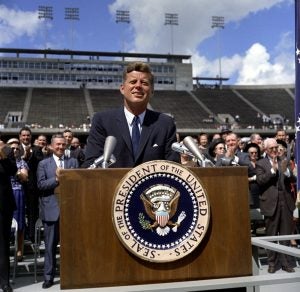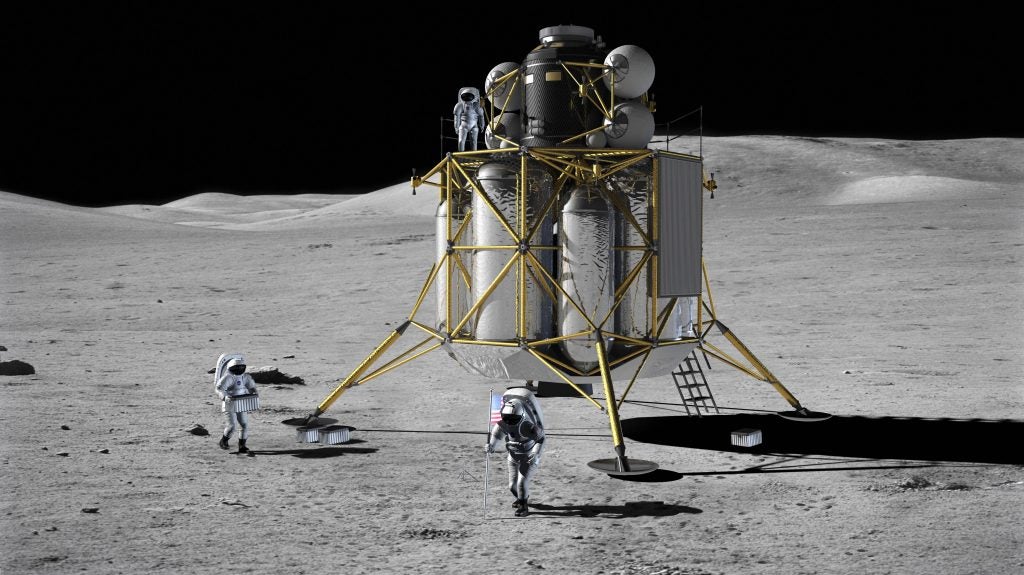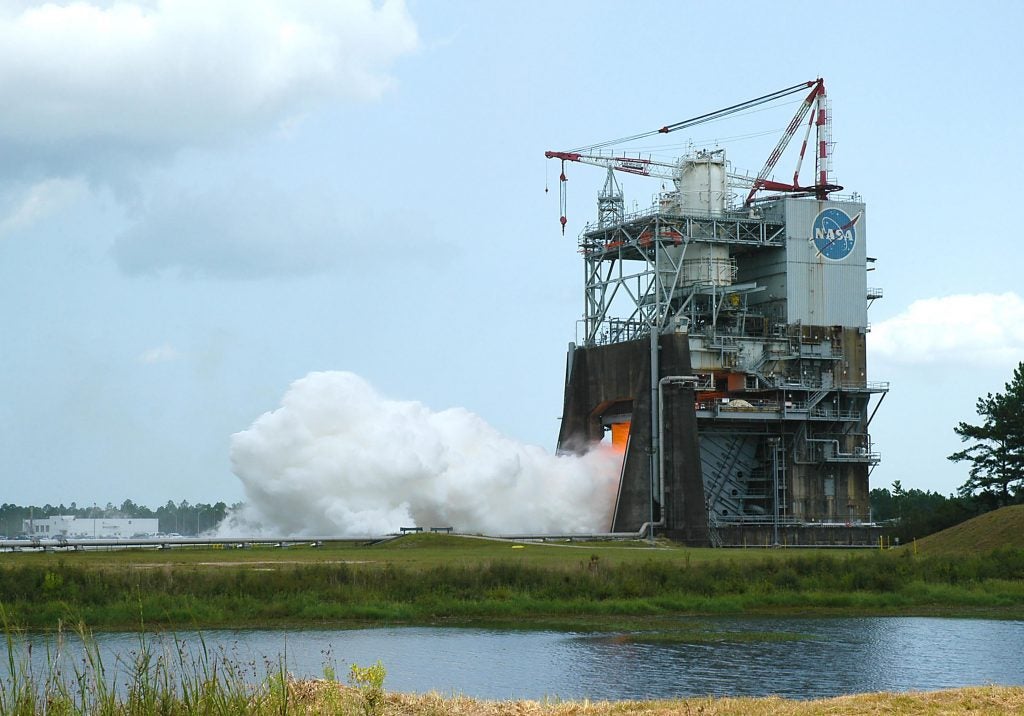If We Went to the Moon Why With Better Technology Havent We Went Back Again
This story is from The Pulse, a weekly health and science podcast.
Subscribe on Apple Podcasts, Spotify or wherever you go your podcasts.
To this mean solar day, people wonder: If nosotros went to the moon in the 1960s, why is it taking so long to get back?
Earlier this twelvemonth, at a meeting of the National Space Council, Vice President Mike Pence said it was "not good enough" that NASA told him it would accept till 2028 to render to the moon.
"We don't have the political will that provides the money to exercise it," is the short reply, said Casey Dreier, senior infinite-policy adviser, chief abet, and biggest space fan at the Planetary Society, a nonprofit that promotes infinite science and exploration.
"Information technology's as well really of import to remember why Apollo happened in the first place wasn't considering of some idealistic, soaring vision of exploration," Dreier added.
President John F. Kennedy did non spend $5.4 billion in 1960s money — what amounts to more than $45 billion today — considering he cared nigh infinite.
"The only reason he committed the resources to Apollo that he did was that he saw Apollo as a front end in the Common cold War," Dreier said.

The big spending boost NASA got went abroad not long after Neil Armstrong and the other astronauts returned to Earth. President Richard Nixon welcomed Armstrong and the Apollo 11 crew dorsum in 1969 , and there were six more than Apollo missions. But past the very next year, in 1970, Nixon cut NASA'southward upkeep by hundreds of millions of dollars and said it was no longer a special programme. Like any other function of regime, man space flying would have to compete for resources.
That'due south why Poppy Northcutt, who worked at Mission Control during the Apollo program, called it a pleasant memory, but as well sad and bittersweet. NASA already had plans for more aggressive missions to the moon and Mars, she said, and she wishes they could have washed those too.
"In Congress' mind, and perhaps in the public heed as well, they viewed it every bit a race, a race with the Russians, and once the race with the Russians was won … in that location was non annihilation more to do," Northcutt said.
NASA'due south upkeep remained depression for decades. The agency's crewed space missions stayed in low earth orbit e'er since, about one-thousandth of the way to the moon — like going a few blocks rather than traveling across the state.
So in 2003, the space shuttle Columbia broke apart in a higher place the globe'due south atmosphere, killing the vii crew members. Dreier said the disaster made the White House and Congress reflect: Why practise we ship humans into infinite? Why are they risking their lives?
Afterward that massive setback, President George W. Bush came upwards with a bold new mission for NASA, perhaps with the idea that if lives are going to exist put at risk with infinite exploration, nosotros might too shoot for the moon. The goal: return to the moon by 2020, live and piece of work on the lunar surface, then become to Mars and other planets. NASA called the program Constellation.
Then-NASA Administrator Michael Griffin chosen it " Apollo on steroids. "
NASA got to work on a bigger rocket, a lunar lander 3 times larger than the ane for the Apollo missions. The Hawkeye was on the moon for a few hours. This one would stay a full week.

In 2008, Eugene Cernan, the final astronaut to walk on the moon , visited the Johnson Space Center in Houston. NASA was already in the concluding stage of the design process for the lunar lander. Kathy Laurini, project manager, remembers Cernan telling her team to add something that would brand being in space a little more pleasant for the astronauts:
"When you're on these missions, you lot're far away from earth, and you're roughing it up, you don't have a nifty place to sleep, it's hard to get to the bathroom … what would really take been prissy is to be able to wake upwards in the morning and have a squeamish hot cup of coffee," Laurini said.
So it came as a total shock when the Obama administration canceled Constellation in 2010. Charles Bolden, the NASA ambassador at the time , described it equally "a death in the family unit."
Some space analysts, to this day, say Obama "ruined space exploration" and "expressed an antipathy to American exceptionalism." Only Dreier noted that Obama inherited the program from George Due west. Bush, who promised an Apollo-sized program but could not pair it with Apollo-sized funding.
"The political support for that initiative never really materialized. And past the fourth dimension the Obama administration came in, they were looking at a programme that was billions of dollars over budget, years behind schedule, and information technology was unclear what level of success they could wait out of that and win."
After Constellation, Dreier said NASA got smart and decided to build something that would work, more or less, no affair where the side by side president wanted to go: a large rocket and a crew capsule that could stay in infinite.
"You lot can ship it to the moon, you lot tin can probably send information technology to an asteroid, maybe through some modifications, yous can send things to Mars, but yous don't need to start over every four years," he said.
There's also something NASA doesn't like to talk almost because it removes the romance of space travel: the space plan is a giant chore-creation program.
NASA shouldn't be shy about it, Dreier said — it'southward part of the big moving-picture show, and it's how infinite exploration gets paid for.

"NASA is one of the purest expressions of human being curiosity that we see in the entire world," Dreier said. "What other authorities agency has fans like this? You don't encounter the Department of Agriculture having people call themselves agriculture fanatics."
People buy NASA T-shirts, pins and hats because infinite exploration is cool. That's why we make movie afterward movie about the astronauts, the gripping human drama, life and expiry stakes, just we don't watch movies nearly the politics of paying for it.
westerveltprolead.blogspot.com
Source: https://whyy.org/segments/why-havent-we-gone-back-to-the-moon/
0 Response to "If We Went to the Moon Why With Better Technology Havent We Went Back Again"
Postar um comentário